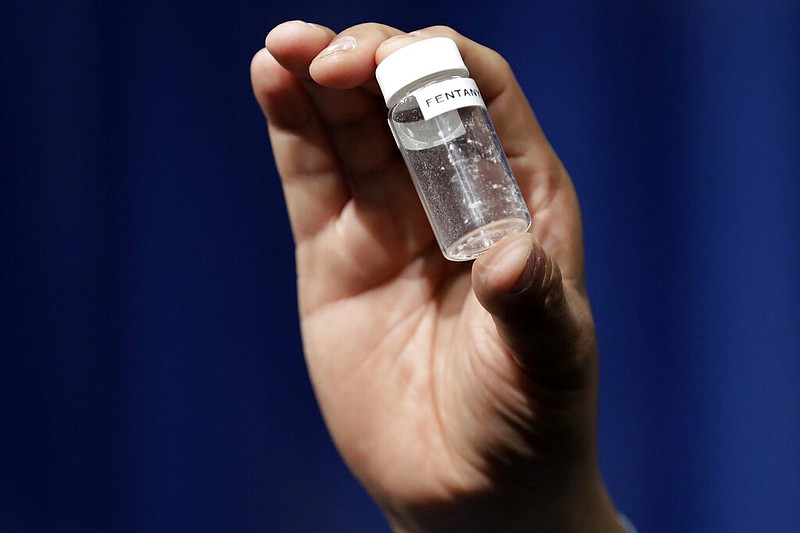The Arkansas Senate on Thursday advanced a bill that intends to hold dealers of fentanyl and other dangerous drugs responsible for overdose deaths.
The 33-0 vote sends House Bill 1456 to Gov. Sarah Huckabee Sanders' desk. The bill, which would create the "Fentanyl Enforcement and Accountability Act of 2023," aims to establish "death by delivery" offenses with strict criminal penalties and is part of a broad criminal justice package endorsed by Sanders.
Sen. Ben Gilmore, the bill's Senate sponsor, said the legislation would put those preying on communities in prison. Gilmore, a Republican from Crossett, lamented the skyrocketing increase of fentanyl.
"Hopefully we can protect our communities and our children," he said.
Arkansas has seen a sharp rise in the number of fentanyl overdoses in recent years. In 2022 there were almost 300 recorded deaths attributed to fentanyl, up from eight recorded deaths five years ago, said Cindy Moran, deputy director of Arkansas State Crime Lab, during a meeting last week.
Because of its extreme potency, even a small dose of fentanyl may be fatal.
Matthew Collins spoke against the bill during a committee meeting Wednesday saying it would lead to addicts being charged with serious crimes intended for dealers.
Collins told the Senate Committee on Judiciary he had a brother who died of a fentanyl overdose.
"One of my brother's suppliers was a fellow addict and friend," Collins said. "Under this he would be given up to life in prison for something that he does not deserve. He was making no money off of this, and he was only supporting his addiction."
Collins noted the bill would retain protections under the Joshua Ashley-Pauley Act, which provides immunity from prosecution for those seeking medical assistance for someone suffering from a drug overdose. But he told lawmakers the bill would undermine the act by "instilling fear in those who simply convey drugs for personal use to friends or family."
While Collins applauded lawmakers for taking aim at the fentanyl crisis, he said HB1456 "misses by a long shot."
The bill's House sponsor Rep. Jimmy Gazaway, R-Paragould, has said he expects the "death by delivery" offenses to act as a deterrent. When asked if he could point to evidence that stricter penalties would function as a deterrent, Gazaway said determining how many people don't commit a crime because of the penalties it carries is challenging.
"I do think this sends a strong message that will have a deterrent effect," he said during a committee meeting last week.
If a dealer provides fentanyl, methamphetamine, heroin or cocaine to a minor and the minor dies, the dealer also would be guilty of "aggravated death by delivery." If the person is less than three years older than the minor who died, the offender would face a prison sentence of 20 to 60 years or life. Otherwise, the person would face a life sentence.
Those who commit the offense of "predatory marketing of fentanyl to minors" by packaging the drug in a way to appeal to children could face a sentence of life in prison and a $1 million fine.
HB1456 also would create an offense for "death by delivery in the first degree," which would apply if a person delivers methamphetamine, heroin or cocaine that results in an overdose death.
This offense would be a Class Y felony, which carries a sentence of 10 to 40 years or life. In certain cases, including if the dealer does not have a prior felony conviction, the offense would be a Class A felony, which is punishable by six to 30 years of imprisonment.
The bill also includes a "death by delivery in the second degree" offense for delivering other controlled substances that result in the death of another person. Depending on the circumstances, this offense could count as a Class A, B or Y felony.
A person found guilty of "trafficking of fentanyl" under the bill would face a prison sentence of 25 to 60 years and a fine of $1 million.
Consensual ingestion of a drug would not count as a defense from prosecution under the bill.
Fentanyl test strips also would no longer be considered drug paraphernalia if the bill is passed, to no longer punish drug users for testing for the substance which can often be mixed into other drugs, making them more lethal.
The Senate on Thursday also passed House Bill 1663, which would establish penalties for "knowingly exposing another person to fentanyl." The bill, by Gazaway, received a vote of 32-0 and advances to Sanders' desk.
Both bills provide exemptions for medical professionals, pharmacists and others who are permitted to legally possess pharmaceutical fentanyl.
